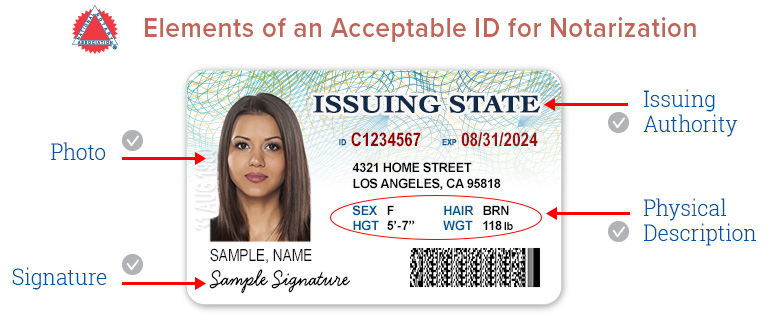Some states specify the types of ID a Notary may accept to identify a signer, but many others leave the determination of an ID's suitability up to the Notary.
If your state does not specify what ID signers must use, the NNA recommends the Notary ask for identification documents issued by the state or federal government that contain:
- A photograph
- A physical description
- The bearer's signature
These elements provide a basis for comparison with the actual physical appearance and signature of the person requesting the notarization.
Acceptable Forms of Identification for Notary Services
| Acceptable Forms of ID |
Unacceptable Forms of ID |
| State-issued driver's license |
Social Security cards |
| State-issued identification card |
Birth and marriage certificates |
| U.S. passport issued by the U.S. Department of State |
Credit cards |
| U.S. military ID |
School ID |
| State, county and local government IDs |
Library card |
| Permanent resident card |
Temporary driver’s license |
In some states, Notaries may be able to accept the following forms of identification:
- "Green card" issued by the U.S. Citizenship and Immigration Services
- Foreign passport
- Driver's licenses officially issued in Mexico or Canada
- ID deemed acceptable to the U.S. Department of Homeland Security
- Inmate ID issued by the State Department of Corrections or Federal Bureau of Prisons, if the inmate is in state or federal custody
- Inmate ID issued by a county sheriff, if the inmate is in the custody of the county sheriff
Although these are commonly accepted forms of ID, remember that each state has its own ID requirements and guidelines. Follow your state's laws addressing acceptable signer identification.

Expired Licenses
State laws differ regarding the acceptance of expired licenses as ID. Some states only permit signers to present current IDs, while others allow Notaries to accept expired IDs as proof of signer identity if they were issued within a specific time frame.
For example, Virginia allows Notaries to accept expired IDs from signers who live in an assisted living facility, provided that the ID has not expired for more than five years from the time of notarization.
Because the laws in many states do not specify if an ID must be current, valid or unexpired, the NNA recommends accepting unexpired IDs as a professional best practice.
If you're in a state that does not accept expired ID, there may be alternative methods of identifying a signer that your state does allow instead, such as using a credible witness.
Acceptable ID FAQs
What if a signer's ID looks suspicious?
Getting a high-quality fake ID is easier than ever before, which makes spotting a fake ID more difficult. However, there are warning signs that you can look out for.
If a photo doesn't closely resemble the signer or the card looks altered in any way, consider it a red flag and inspect the card thoroughly.
Make sure the photo and physical description match the signer. Confirm all of the security measures your state includes on ID cards are present too.
Not all of these warning signs mean you're dealing with an imposter, though. People often change their name, gain or lose weight, cut or dye their hair and some have had cosmetic surgery or gender reassignment surgery.
Learn how to handle name discrepancies and check out Notary Basics: How to deal with unreliable or suspicious ID for more details.
What if the signer does not have identification?
A 2023 survey by the University of Maryland in partnership with Brennan Center for Justice and SSRS found that nearly 21 million voting-age U.S. citizens do not have a current (non-expired) driver’s license.
In situations where a signer does not have an acceptable ID or if you're uncertain about the ID, check your state laws regarding credible witnesses as a means of identification.
Are two forms of ID required for a Notary?
A single form of valid ID is acceptable for notarization in most cases. However, there may be cases where multiple forms of identity verification are allowed.
For example, California Notaries may accept the oath or affirmation of two individuals who personally know the signer and can verify their identity. These individuals are referred to as credible witnesses, and they must each present a valid ID.
Notaries who perform loan signings often ask signers for two forms of ID as part of their loan signing duties — and not part of their general Notary responsibilities.
Whether you’re a Notary or Signing Agent, it's always OK to request an additional form of ID if you find name discrepancies between the signer's ID and the document and/or if you’d like further confirmation the person signing is who they claim to be.
While some states are very strict about the forms of ID that can be used and others have general ID rules, many states leave it up to the Notary's judgment. Before making a decision, consider that you may need to defend your notarization in the future.